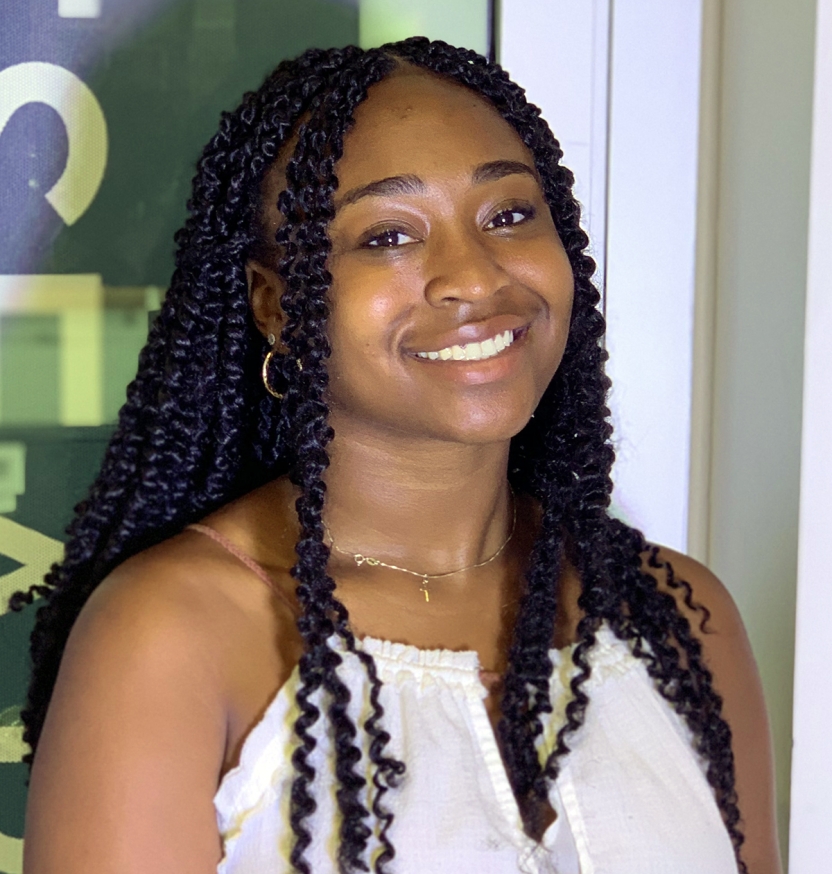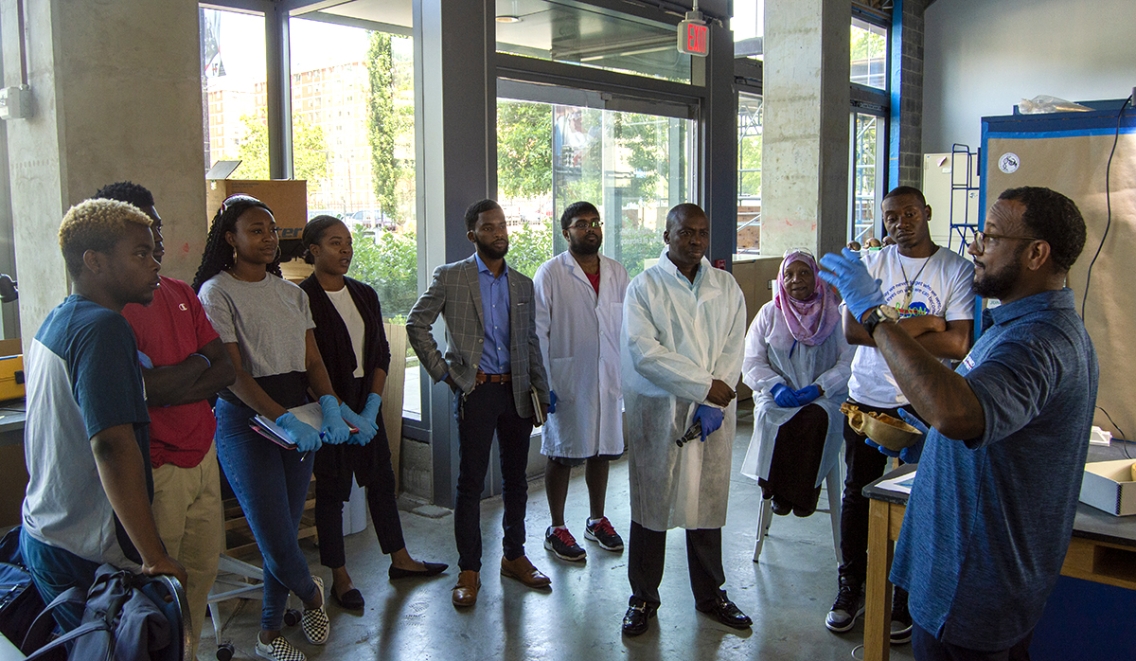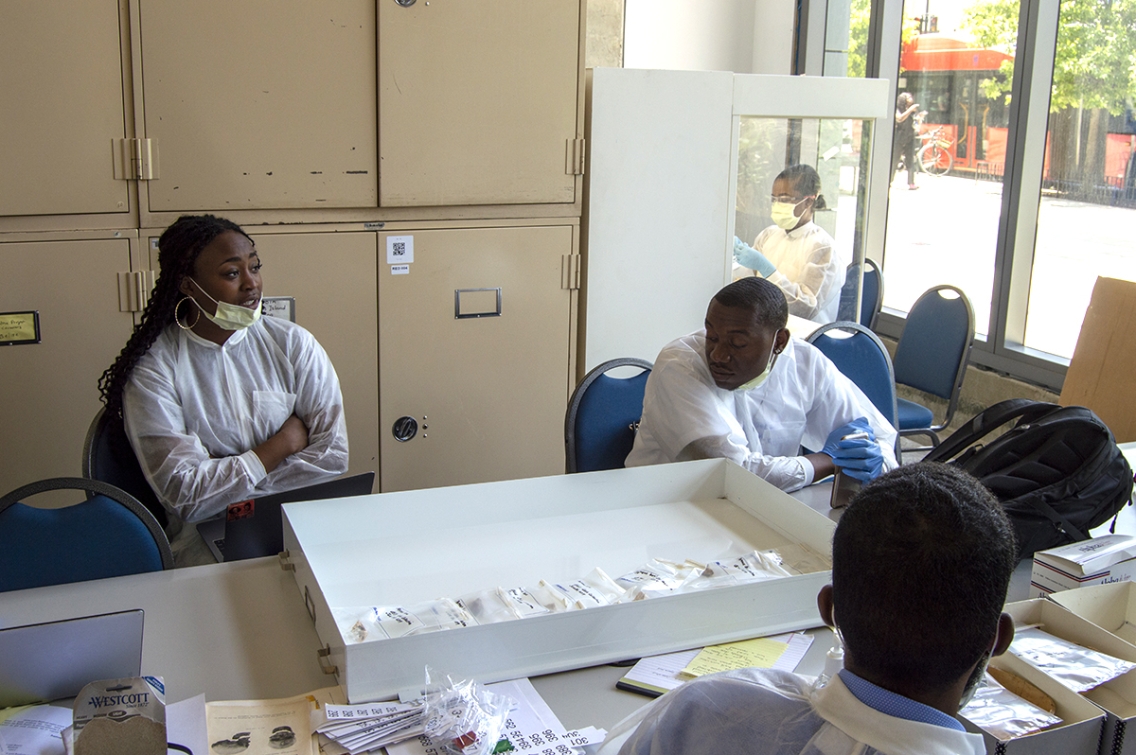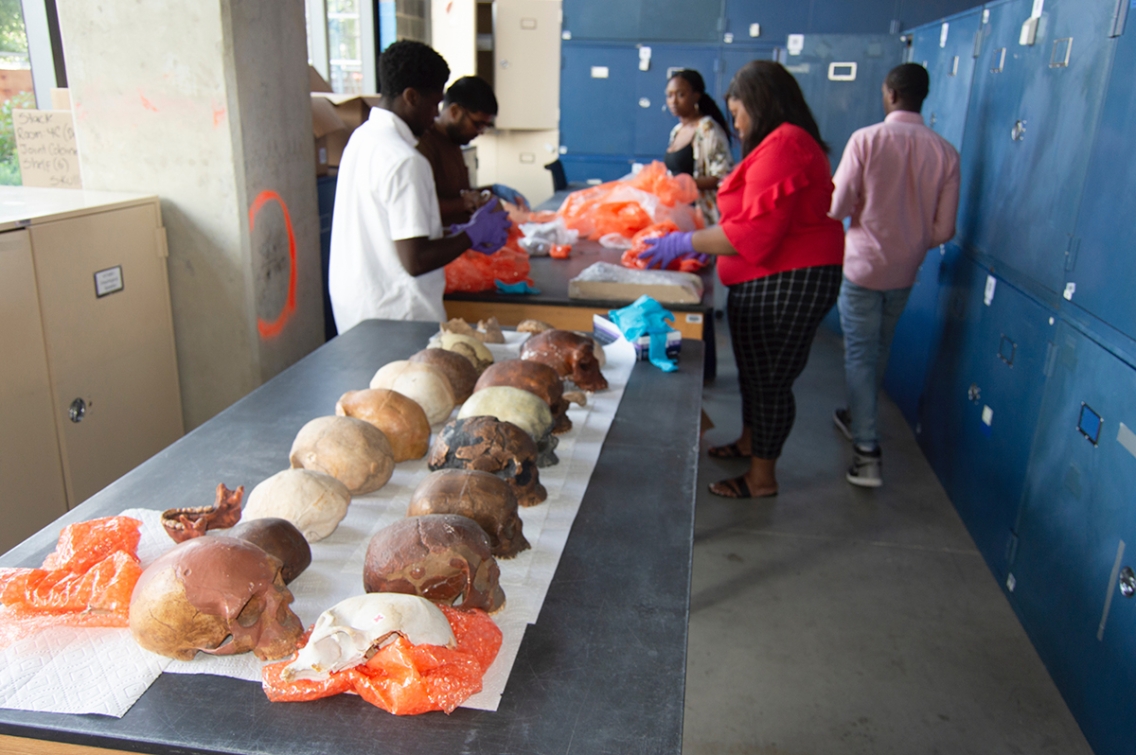Student Joins Effort to Unlock Genome of the African Diaspora
| by Gaen Murphree

MIDDLEBURY, Vt. — Neuroscience major Megan Job’s moment of bliss this past summer came while standing with lab coat on, goggles on, gloves on, contemplating taking a drill to a human skull belonging to the W. Montague Cobb Research Laboratory based at Howard University. This is a key step in the Cobb’s ongoing project to unlock the genome of the African diaspora.
First came some serious training from the Washington, D.C., chief medical examiner.
“He was like, ‘Listen guys, this is not funny. If you mess this up, there goes somebody’s whole genome sequence. So take notes and make sure you do this right.’ Then he taught us a strategy on how to pop the petrous bone out.”
Scientists have found that the petrous bone, a part of the skull near the inner ear, is dense enough and protected enough to more accurately yield DNA from ancient and historical samples.
Job said when she first approached the task, she felt a mixture of terror—
“I was scared to mess up, because if I did, then somebody’s whole genome would be gone and they could help the whole black population.”
—elation—
“Here I was doing something that I absolutely was so excited to wake up to do every single day. Even though I had been through two difficult years, I was here doing it. I had worked really hard to get here, to sit in this chair, to have somebody’s random dust in my face as I drilled.”
—and a renewed sense of purpose—
“It was bigger than just me being at Howard cutting out bones. I found that I have things to do with my life. It’s my responsibility to build on this field, on biological anthropology, on epidemiology, on epigenetics. It’s my responsibility to ask questions about former ancestors who didn’t have the—they didn’t have the authority to ask questions. So if I’m able to get a degree, if I’m able to study, if I’m able to ask questions and then answer these questions with research, I want to do that for them, for myself, for my kids, for my kids’ kids.”

The chief medical examiner of Washington, D.C., Roger Mitchell, trained the summer research assistants on the extraction of petrous bones.
The study of the human genome has largely focused on northern Europeans, explained Jeremy Ward, the Albert D. Mead Professor of Biology. (Indeed, a recent study found that 78 percent of all individuals represented in genome research were of European descent—less than 4 percent were persons of African, Middle Eastern, Oceanian, or Hispanic or Latin American descent combined.)
“The current human reference genome, as good as it is—let’s not discount tons of money and work and effort and all that—it’s missing a lot of stuff that billions of humans have,” said Ward. “The diversity in the reference genome is low.”
“In the Americas, the African American community has been largely left out of genome science.”
One huge implication of this omission, said Ward, is in health.
“Northern Europeans have one set of genetic challenges that they face (for example, cystic fibrosis), but there are other things that need to be known in the rest of the world, right?”
Looking at African and African-diaspora genomes is also important, Ward explained, because of Africa’s centrality to the human story.
“Africa has the greatest genetic diversity on earth by far. So for example, someone from England and someone from Hungary—their genomes are going to appear much more similar to each other when compared to a Ghanaian and a Kenyan.”

Megan Job ’21 discusses petrous bone extraction with other research assistants in the Cobb Laboratory.
Ward likewise expects studies of the African American genome to reveal far greater diversity than found among non–African Americans.
Given the ethical complexities of working with both human remains and the DNA of living individuals, said Ward, and given past transgressions, scientists are increasingly realizing the importance of having genomic studies carried out by those who are also members of particular communities.
This makes the Cobb Lab’s work, rooted as it is in Howard’s mission and history, vitally important.
Job found her position as a researcher at the Cobb Lab in part because of an ongoing conversation about the African diaspora and the human genome that she and Ward began when she took his Cell Biology and Genetics class her first semester at Middlebury.
“One of the things I love about Megan is she doesn’t want the one-sentence answer. She has this insatiable curiosity about these things. She’s also very excited to learn about her own heritage. And the conversations I’ve had with her have been probably the most honest and revealing that I’ve had here. And I’ve been teaching this stuff for a decade at least,” said Ward.
For Job, part of what caught her attention that first semester was realizing how inherited diseases can affect specific populations.
“One day Professor Ward started talking about the sickle cell trait. It’s like the classic mutation human evolution example of how there was stress on a population, and in order to beat the stress this mutation developed, the sickle cell mutation. The sickle cell trait actually runs in my family. So when he said that it only predominantly affects African Americans, I was like, “Hmm, that’s crazy to think that something biological had an effect on a race.”

The entire lab discusses which skulls to display in the windows of the Cobb Laboratory as an educational display for the public.
Last spring, Ward read about the work of computational biologist Latifa Jackson, who leads the Cobb’s study of contemporary DNA. He sent it to Job, encouraged her to apply to the Cobb Lab for the summer, and helped her secure funding through Middlebury’s Center for Careers and Internships and other campus sources.
“We always want to try to make opportunities available for students who express an interest, but with Megan we got way more than we could ever have hoped for,” said Jackson, who in addition to her research at CRL is also an assistant professor of pediatrics at the Howard University College of Medicine. “She’s somebody who is really thoughtful. She’s naturally intellectually curious. She has really mastered the ability to be a keen observer and adopter of the scientific process. She’s a phenomenal future scientist.”
The Cobb Lab is unique in its approach to documenting the African American genome in several ways. Perhaps most notably, its collection spans 400 years of African American history, including skeletal remains from an excavated African burial ground in New York City dating as far back as the 17th century and remains from a recently excavated burial ground on St. Helena Island of Africans liberated from slave ships in the early 1800s. In addition to its historic samples, the Cobb is collecting DNA from contemporary persons of African descent, holding sampling days in Washington, D.C., obtaining DNA from persons in Africa (especially those in countries that supplied the slave trade) and trying to create as inclusive a genomic picture as possible of the African diaspora.
Jackson noted that while the research is important in terms of health outcomes and scientific discovery, it is also important in terms of identity.
“As people were brought here, they were stripped of all of the things that made them connected to their lineage. And so the question is how do you take and how do you encourage the people who’ve been stripped of their lineages to find their identity in ways that are meaningful and that tie them back both to homelands from 20 generations ago and also allows them to still feel deeply rooted in the places that they currently live?” she said.
Job is continuing work with the Cobb during her current semester in Brazil, where she’ll be collecting noninvasive DNA samples from persons of Afro-Brazilian heritage. She plans to return to CRL during J-term and continue associated research once back at Middlebury.
That same kind of initiative and leadership is also part of what brought Job to Middlebury on a four-year, full scholarship as a Posse Foundation scholar and saw her honored with a spring 2019 Angels Award, given annually “to a sophomore woman of color who throughout her first year demonstrated leadership, scholarship, and activism in the college community.”
Job and co-Angels awardee Destini Armstrong have given voice to their experiences as women of color on campus—with humor and honesty—in a series of podcasts called blckgrlmgc (for Black Girl Magic).
Working at the Cobb, she said, and being “blown away by black excellence” has helped her understand how she wants to apply her Middlebury education. She plans to pursue a joint MD/PhD, with a possible focus on epidemiology or bioanthropology.
“Cutting out the petrous bones, bagging them and writing numbers. I didn’t just write the numbers. I knew the person. One man was a “Jr.,” so his father had the same name. He died at the hospital that was down the block from Howard. He had died from tuberculosis. A lot of people back in the day died from tuberculosis.
“Some of these diseases still plague black people today. So I’m like, if we’re number one in technology or whatever, number one in medicine, why are some of these diseases still plaguing the black community?
“And then I got to thinking, black people need to be in the room where the questions are being asked.”

